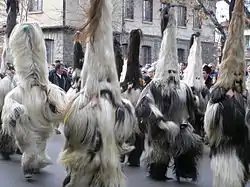кукер
Bulgarian

кукери (kukeri)
Etymology
Technically reflecting Proto-Slavic *kukyrъ, possibly derived from Proto-Slavic *kukъ, *kuka (“feisty spirit”) + -ер (-er).
Alternative theories propose borrowed origin from a term, akin to Bulgarian кукла (kukla, “toy, puppet”) (Greek loanword) or Bulgarian гу́гла (gúgla, “hood”) (Latin loanword), both ultimately from Latin cucūllus (“hood, covering for the read”).
Noun
ку́кер • (kúker) m
- (dialectal) kuker (person dressed in a carnival costume, who chases evil spirits in specific days of the year)
- Synonyms: бабугер (babuger), станчинар (stančinar)
Declension
Declension of ку́кер
| singular | plural | |
|---|---|---|
| indefinite | ку́кер kúker |
ку́кери kúkeri |
| definite (subject form) |
ку́керът kúkerǎt |
ку́керите kúkerite |
| definite (object form) |
ку́кера kúkera | |
| vocative form | ку́кере kúkere |
ку́кери kúkeri |
Alternative forms
- кукир (kukir)
References
- кукер in Rečnik na bǎlgarskija ezik (Institut za bǎlgarski ezik)
- кукер in Rečnik na bǎlgarskija ezik (Čitanka.Info)
- Georgiev V. I., editor (1986), “кукер¹”, in Български етимологичен речник [Bulgarian Etymological Dictionary] (in Bulgarian), volume 3, Sofia: Bulgarian Academy of Sciences, page 89
This article is issued from Wiktionary. The text is licensed under Creative Commons - Attribution - Sharealike. Additional terms may apply for the media files.